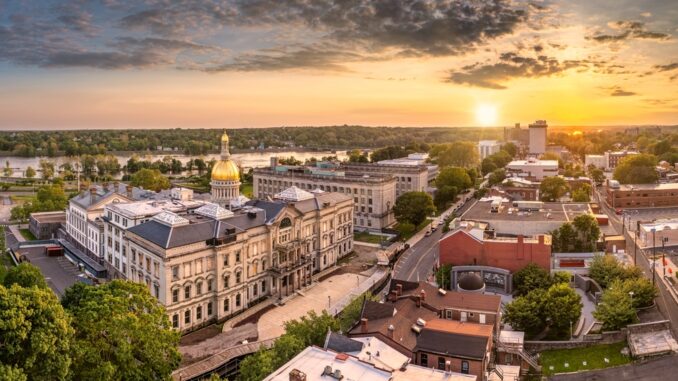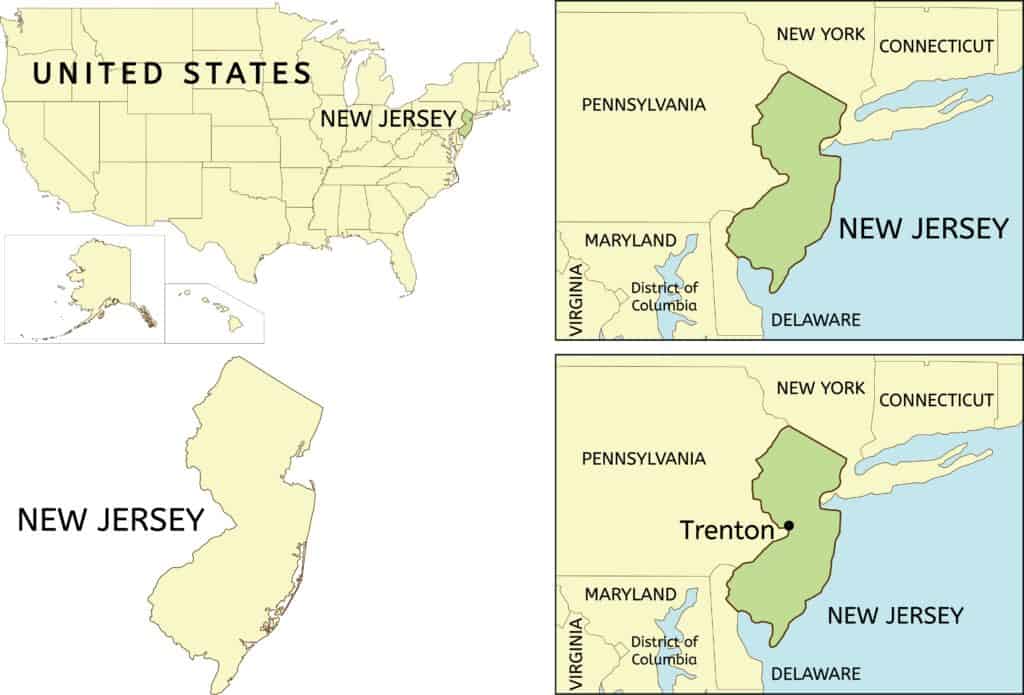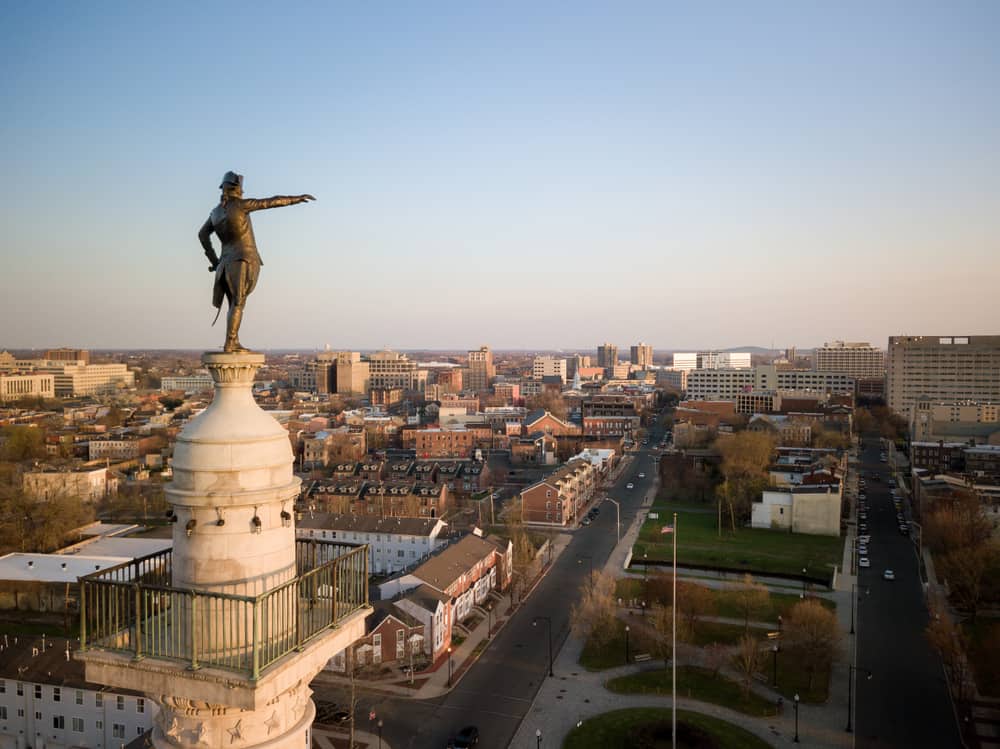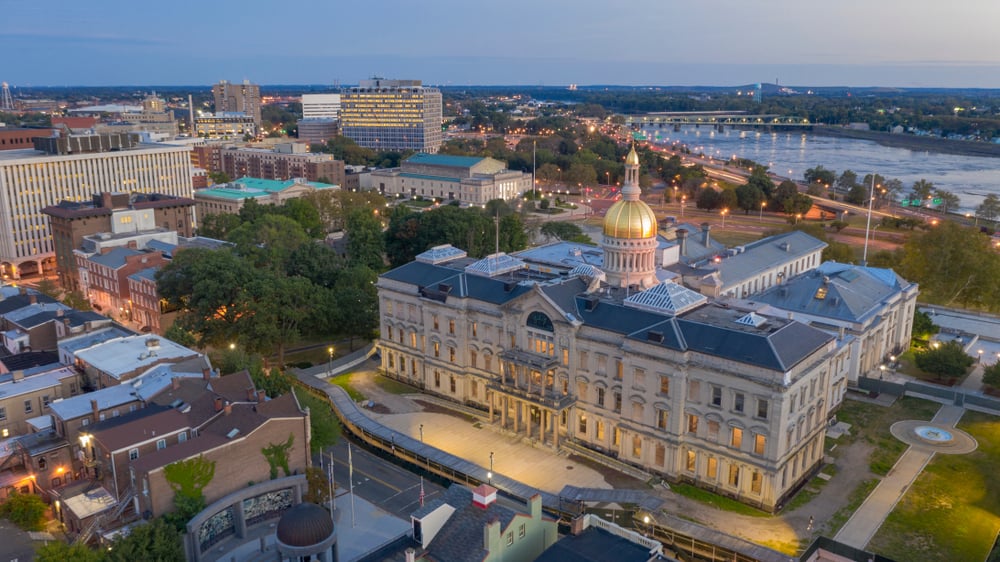
Although not the largest one in the state, neither by size nor by population, Trenton is the capital of New Jersey.
Where is the Capital of New Jersey Located?

It is located about 55 miles southwest of New York City and 28 miles northeast of Philadelphia, Pennsylvania. Some people consider it to be in North Jersey, making it the southernmost city in the Tri-State Area, while others put it squarely in South Jersey, making it the northernmost city in the Delaware Valley. About 5 miles to the southeast of Trenton is New Jersey’s geographic center.
Trenton is considered by local residents to be a part of Central Jersey, a vague region that is neither northern or southern. The population is evenly divided over whether it falls under New York’s or Philadelphia’s zone of influence. Despite its proximity to Philadelphia, many new residents choose to settle there so that they can avoid the high housing costs of the metropolitan area of New York.
Brief History of Trenton

The city of Trenton was given its name in 1917 to honor a local landowner named William Trent. Even before that, in 1679, when the area was still known as the falls of Delaware, the Quakers came and set up shop. Due to persecution in the UK, Quakers were granted religious freedom in the USA.
Trenton, New Jersey grew steadily throughout the nineteenth century, becoming a major center for industry. Trenton became a major producer of steel, rubber, wire ropes, ceramics, cigars, and other commonplace goods during the 1920s. Trenton’s rich industrial heritage has resulted in a number of useful products being developed there, including Bayer Aspirin, magic markers, and oyster crackers.
The state capital is located on the banks of the Delaware River, which separates New Jersey and Pennsylvania. This area has played an important role in American history. In addition to hosting the first ever professional basketball game in 1896, Trenton is also famous for being the site of the first public reading of the Declaration of Independence.
American forces led by General George Washington were victorious in their raid against British forces at Trenton at the end of 1776, resulting in the decisive Battle of Trenton. The tide of the American Revolution was turned largely because of this victory. Because of this, Trenton was a pivotal location in setting policies for the young nation of the United States of America.
When did Trenton become the Capital of New Jersey?

Trenton was designated as the state capital on November 25, 1790, and the City of Trenton was incorporated within Trenton Township on November 13, 1792. On February 21, 1798, the New Jersey Legislature passed a law officially incorporating Trenton Township as one of the state’s first 104 townships.
Ewing Township was created on February 22, 1834, from a portion of Trenton Township. On April 10, 1837, the rest of the area of Trenton Township was annexed by the City of Trenton.
Why is Trenton the Capital of New Jersey?
The geography and background of the city provide the key to the answer to this question.
Trenton, in contrast to Newark and Jersey City, which are located in the state’s northern region near New York, is situated in the middle of the state. When traveling between New York City and Philadelphia, the most major areas in Colonial America, Trenton is roughly in the middle. Since the city is located on the Delaware River, Trenton can easily import water from other parts of the region.
Additionally, the fortunate timing and commemorated impact of the Battle of Trenton are largely responsible for making Trenton the capital of New Jersey. Because of its strategic location and significance, the newly formed United States of America made Trenton its capital for two months in 1784.
Trenton was the clear and obvious choice as New Jersey’s capital because of its historic value and the notion that important state conferences were already being hosted there.
Features of Trenton
Climate
Trenton has a climate that is transitional between a humid subtropical and a cooler humid continental, leaning more toward the former. It has four seasons that are roughly equal in length, and precipitation is fairly evenly distributed throughout the year. A combination of factors, including vicinity to the shore, altitude, and adiabatic warming of the Appalachian Mountains, create the humid climate.
The weather in the winter is typically chilly and wet. The summers are long and sweltering. The annual amount of snowfall can change significantly.
Economy
In the late 19th and early 20th centuries, Trenton served as an important industrial hub. As a reminder of that time period, the Lower Free Bridge still bears the slogan “Trenton Makes, the World Takes”. The largest fixture factory in the United States of America was located there.
Trenton, like many American cities in the 1970s, struggled as a result of the nationwide decline in industrial and manufacturing jobs. At the same time, state government offices started moving out to the suburbs. However, Governors tried to make the downtown area the epicenter of state government in an effort to revitalize it. A large number of state office buildings were built between 1982 and 1992.
Today, the State of New Jersey continues to be Trenton’s largest employer. Twenty thousand state employees commute each weekday from the suburban areas.
Population
Trenton’s 2022 population is estimated at 92,063. Since the last census in 2020, when the city’s population was recorded at 90,871, Trenton’s population has grown by 0.65% per year and decreased by the same as well. Trenton is New Jersey’s tenth largest city based on population.
Best Places to visit in Trenton
Following are just a few of the places you can visit in Trenton:
- You could incorporate a visit to the Pennsylvania Bridge onto your itinerary if you value contemporary design and construction.
- The WWII Memorial and The Old Barracks Museum is a must-see for history buffs.
- A trip to the New Jersey State Library to learn more about the history and culture of the state.
- You can see one of the nation’s oldest state capitol buildings, the New Jersey State House, which dates back to 1792. The state legislature has always met in this building, which is now a National Historic Landmark due to its long history of service.
- The Trenton Battle Monument, a soaring obelisk honoring the soldiers who took part at the Battle of Trenton on December 26, 1776, is also one place to visit. The monument is a major Trenton draw for visitors, as it can be found in the heart of the city.
- One of Trenton’s most well-attended cultural institutions is the Patriots Theater at the War Memorial. There are several performing arts groups that call this theater home, such as the Opera Festival of New Jersey, the Trenton Ballet, and the Trenton Symphony Orchestra.
